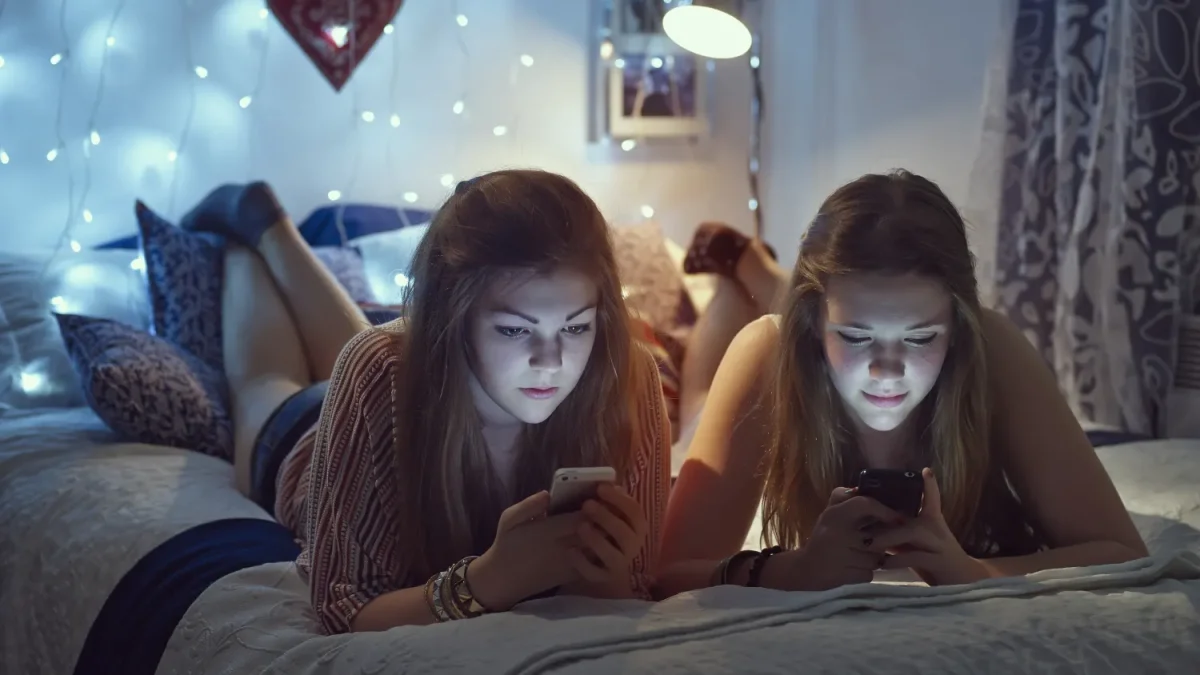Smartphones, arguably one of the greatest innovations of all time, play a major role in society. However, what seems like one of the best things ever, with all its positive benefits, comes with some serious consequences, making people question whether smartphones are truly beneficial.
It is no surprise that smartphones are highly addictive. Look almost anywhere, and you’ll find someone using a smartphone. These devices have endless opportunities to help people. Phones not only help with communication and daily tasks, but they also have some severe negative consequences.
The National Center for Health Statistics conducted a study on the correlation between hours of screen time and susceptibility to anxiety and depression. The results showed that those who spent more time on screens were more susceptible to anxiety and depression.
For those who had 4+ hours of screen time for 2 weeks, 27.1% showed symptoms of anxiety compared to those with less than 4 hours of daily screentime, only 12.3% showed symptoms. This statistic shows a strong correlation between hours of daily screen time affecting mental health.
These stats were also shown for depression. Those who had 4 or more hours of daily screen time for 2 weeks were 25.9% more likely to show symptoms compared to those with less than 4 hours.
What seems like a very helpful device has led to an increase in depression and anxiety. There are multiple explanations for why phones and screen time are causing such an increase in risk for mental disorders.
One major reason is the content one consumes on the device. Phones have led to a great deal of connection, but this connection is often leading people to feel more disconnected. One example of this is social media, platforms designed for one to share ideas, pictures, memories, thoughts, and so much more with others. What seems like a perfect idea has backfired.
Take Instagram, a popular social media platform. Instagram is often used to share photos and videos with those online. However, these photos/videos can easily be abused by the use of filters to distort the photos. This can often be used to edit people to look more like what is stereotypically known as “perfect” or change photos to appeal to the general public.
This trend can lead to people feeling very insecure about themselves and lacking self-confidence. The decline of natural photos and unedited photos makes teens and others feel as if they are not good enough. These feelings can turn into a major issue and may lead to mental disorders.
Depression and anxiety are not the only issues with social media. Another issue with the content produced is the maturity of the content. Often, people post violent or sexual content that should not be exposed to younger audiences. However, with social media, it has made it easier and easier for teens to gain access to content they may not be mature enough to view.
Phones allow for a lot of communication. This communication is key to daily life, such as texting and phone calling, which are constantly used. Many can’t imagine their life without having access to such a device.
This communication, however, has also backfired. Bullying, which has been around as long as anyone can remember, has now taken its toll online. What originally started in schools as a major issue has found its way onto platforms.
People are constantly commenting negatively on others and spreading negativity throughout these platforms. Because people are so interlocked and connected on these platforms, it allows rumors to spread very quickly.
These platforms are full of people constantly commenting and creating, making them very hard to monitor. This allows for constant cyberbullying to go on without many knowing about it.
This usage of negativity on platforms can also lead to an increase in mental health issues. Phones provide so much opportunity and entertainment; they are in constant use. This use has turned into what could be classified as an addiction.
Addiction to screens may be commonly found in teens and it takes time away from other important aspects of life, such as sleep.
One study found a strong correlation between screen time, sleep, and mental health. The results showed that 50.4% of all teens had 4 or more hours of daily screen time, and 59.9% of those who had 4+ hours of screen time were also not frequently rested.
Sleep plays a major role in life because it is the body’s way of recovering. Without a proper recovery, it can lead to an increase in susceptibility to mental issues and cause many problems in the body.
While phones and other devices are an amazing innovation, they are also playing a major role in the destruction of society. It is important to acknowledge the impact these devices have on one’s life to prevent further issues and maintain a healthy lifestyle.
https://www.cdc.gov/nchs/products/databriefs/db513.htm
https://pmc.ncbi.nlm.nih.gov/articles/PMC10948475/
https://www.cdc.gov/pcd/issues/2025/24_0537.htm







































